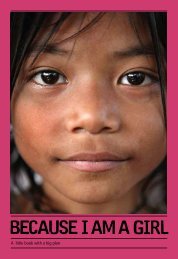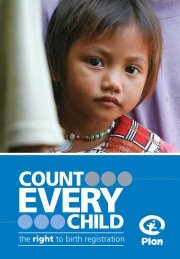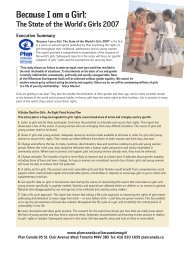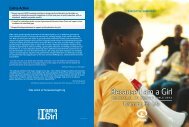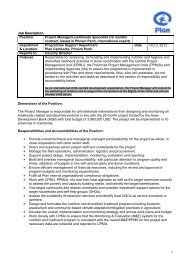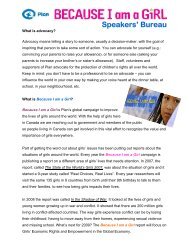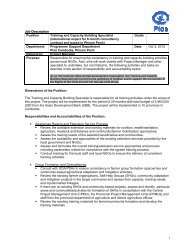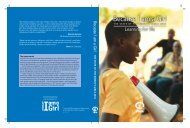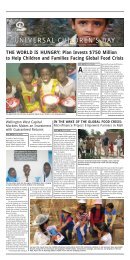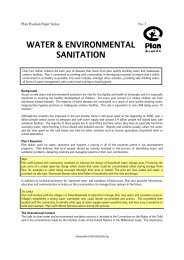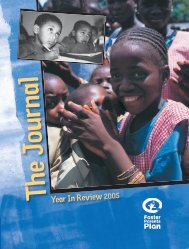Plan Worldwide Annual Review and Combined Financial ...
Plan Worldwide Annual Review and Combined Financial ...
Plan Worldwide Annual Review and Combined Financial ...
You also want an ePaper? Increase the reach of your titles
YUMPU automatically turns print PDFs into web optimized ePapers that Google loves.
Work during 2012 towards our strategy<br />
1 Tackling exclusion<br />
Reaching marginalised children<br />
<strong>and</strong> communities<br />
We aim to focus our work on children <strong>and</strong><br />
families who have been excluded from<br />
development because of poverty, ethnicity,<br />
gender, disability or other factors. Reaching<br />
excluded groups <strong>and</strong> individuals within<br />
communities requires dedication, persistence,<br />
time, money <strong>and</strong> cultural sensitivity. <strong>Plan</strong> has many<br />
programmes targeted at excluded groups, however,<br />
ensuring all our programmes <strong>and</strong> processes engage<br />
with the most vulnerable <strong>and</strong> excluded people is<br />
very challenging <strong>and</strong> complex.<br />
With the help of expert external consultants<br />
we have reviewed our current practice <strong>and</strong><br />
developed a comprehensive approach to<br />
tackling exclusion, <strong>and</strong> a plan for addressing<br />
the implications of this commitment for <strong>Plan</strong>.<br />
This will be a long-term process, requiring<br />
sustained management commitment.<br />
Many of our programme countries are exploring<br />
issues around exclusion in their local context.<br />
They are looking critically at which children <strong>and</strong><br />
youth are reached by our work – <strong>and</strong> which are<br />
left out – <strong>and</strong> are developing new ways to tackle<br />
both the causes <strong>and</strong> consequences of exclusion.<br />
Promoting gender equality<br />
One of our priorities in tackling exclusion is<br />
promoting gender equality. In 2012, we rolled out<br />
our gender policy globally. We are also developing<br />
a gender audit tool for our programme work.<br />
See the section on Assessing <strong>and</strong> increasing our<br />
effectiveness on page 10 to read about more<br />
about the work we have done in this key area.<br />
2 Improving programme quality<br />
This commitment does not only involve<br />
keeping track of the impact that our<br />
programmes have on individuals <strong>and</strong><br />
communities. It also means making sure<br />
that each element of programming –<br />
including identifying communities, designing<br />
<strong>and</strong> agreeing programmes with communities,<br />
providing training <strong>and</strong> assessing <strong>and</strong> reporting<br />
on outcomes – is of the highest possible quality.<br />
Our performance agenda<br />
We have been working to define further our<br />
child-centred community development approach<br />
to ensure field staff consistently provide high<br />
quality assistance to the people they work with.<br />
To read more, see the section on Assessing <strong>and</strong><br />
increasing our effectiveness on page 10.<br />
Developing an academy for continuous<br />
staff learning<br />
This centre of excellence will make sure <strong>Plan</strong>’s<br />
staff reflect <strong>and</strong> learn on our core principles<br />
of child-centred community development.<br />
The academy will improve our staff’s<br />
knowledge, skills <strong>and</strong> practices in community<br />
development <strong>and</strong> emergencies. We have<br />
recruited a team to manage this project.<br />
Our academy should be operational by<br />
the end of 2013.<br />
Boosting technical knowledge in<br />
thematic areas<br />
<strong>Plan</strong> is putting in place global teams of technical<br />
advisors, who will work to improve the quality<br />
<strong>and</strong> effectiveness of our programmes within<br />
thematic areas such as gender, child protection<br />
<strong>and</strong> education.<br />
3 Exp<strong>and</strong>ing successful programmes<br />
Replicating effective projects to reach<br />
more children <strong>and</strong> young people<br />
We want to ensure that our programmes achieve<br />
maximum impact. This may mean identifying<br />
interventions that can be implemented on a larger<br />
scale to reach more children. It may also mean<br />
improving programmes to reach the most difficult<br />
to reach; or working with others to adopt <strong>and</strong><br />
replicate good practice.<br />
We are working to develop a broader<br />
underst<strong>and</strong>ing of the concept of scaling up<br />
because looking from a rights-based perspective,<br />
bigger is not always better. A review conducted<br />
in 2012 (see <strong>Review</strong>ing our work to scale up<br />
programmes on page 11) proposed a new<br />
definition <strong>and</strong> encouraged us to always ask the<br />
critical question: “What is the best way to scale<br />
up this programme?”<br />
We have also established a research <strong>and</strong> a<br />
knowledge management group to improve the<br />
quality of research <strong>and</strong> ensure that <strong>Plan</strong> teams<br />
share <strong>and</strong> learn effectively from our experiences.<br />
<strong>Plan</strong> in five years’ time<br />
4 Extending our influence<br />
Strengthening our global advocacy on<br />
behalf of children <strong>and</strong> young people<br />
<strong>Plan</strong> seeks to become a leader of global<br />
thinking <strong>and</strong> advocacy, particularly in the<br />
areas of education <strong>and</strong> child protection.<br />
Significant work took place during 2012<br />
to build our internal capacity <strong>and</strong> skills so<br />
we can launch our global Because I am a Girl<br />
campaign in October 2012. Our overarching<br />
campaign goal, to ensure girls transition to<br />
post primary education, is led by advocacy<br />
goals, supported with programme efforts<br />
<strong>and</strong> communications messaging.<br />
We have opened offices in New York <strong>and</strong><br />
Addis Ababa, adding to our current teams<br />
in Brussels <strong>and</strong> Geneva, to enable closer links<br />
with the UN <strong>and</strong> the NGO community.<br />
<strong>Plan</strong> will be an organisation known for quality, rights-based programmes for children,<br />
especially those who are most marginalised – our programmes will make significant<br />
impacts on the lives of children <strong>and</strong> their families. Above all, we will be an organisation<br />
that listens to its stakeholders <strong>and</strong> supports them to have a voice <strong>and</strong> be heard.<br />
<strong>Plan</strong> will also be recognised for its sound, collaborative processes, including a strong,<br />
modern, shared monitoring <strong>and</strong> evaluation system.<br />
For further information <strong>and</strong> updates on our strategic progress, please visit<br />
plan-international.org/strategy<br />
OUR STRATEGY<br />
9



